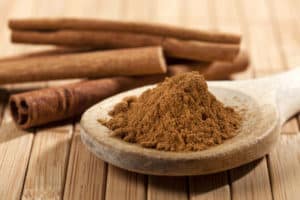Every day there are new studies touting the best medicines and supplements that can improve your brain health. But believe it or not, some of the items you can take for your mind can be found in your kitchen cabinet. Check out these five spices that will boost your brain power.
Cinnamon
A favorite spice used in everything from oatmeal and pancakes to apple pies and sweet breads, cinnamon comes from the bark of a tree native to South Asia.

A study published in 2015 found that a cinnamon spice extract protected lab rats from cognitive impairment and brain damage. But the brain benefits for humans are also numerous. Eating cinnamon has been shown to reduce inflammation, improve memory, increase attention and enhance cognitive processing.
Nutmeg

Nutmeg is composed of a variety of compounds that have been shown to boost mood, relieve pain, relax blood vessels and lower blood pressure. Research even suggests that a nutrient found in the spice slows cognitive delay in Alzheimer’s disease patients. Nutmeg has also been known to help promote the recovery of brain tissue after a stroke. The spice originates from an indigenous Indonesian evergreen.
Cloves
Also native to Indonesia, but made from the dried flower buds of an evergreen clove tree, cloves are an antioxidant superspice. Not only does it have some of the antioxidant power of blueberries, a compound found in the spice is 29 times more powerful than aspirin when it comes to preventing blood clots.
Ginger

Ginger is an excellent pain reliever made up of active compounds that mirror that of capsaicin, a well known pain reliever found in chili peppers. But ginger is pretty spectacular on its own; it reduces nausea, controls inflammation, counters the movement of cell-damaging free radicals and works as a blood thinner. This spice is also known for protecting brain cells from Alzheimer’s related deterioration. Sixty middle-age women who participated in a 2012 study found that 800 mg of ginger extract improved their working memory and attention.
Cardamom
A study published in the Indian Journal of Biochemistry and Biophysics found that consuming just a half teaspoon of cardamom a day for three months, in conjunction with taking part in a healthy diet, normalizes blood pressure and lowers risk of a stroke. The spice does this by relaxing the arteries and the muscles of the heart. A close relative of ginger and turmeric, cardamom’s antibacterial properties and antioxidant properties also help protect the brain cells from free radical damage.
Related: 5 Foods to Boost Your Immune System
Ronke Idowu Reeves is a writer and journalist who hails from Brooklyn, NY. Her news and entertainment stories have appeared on WABC-TV-New York, Fox News Channel, VH1, BET.com plus in Sundance Film Festival’s Sundance Daily Insider and People Magazine.


![How To: ‘Fix’ Crepey Skin [Watch]](https://cdn.vitalupdates.com/wp-content/uploads/2017/05/bhmdad.png)












